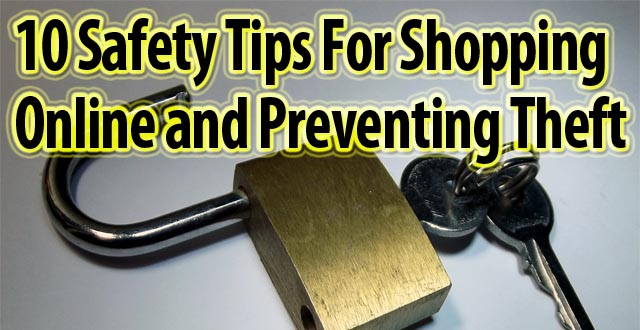
Online shopping can sometimes be dangerous. More than likely no physical harm will come to you, but the kind of harm that can still ruin your life. There are people out there who will go to great lengths to steal your identity, get your personal information, hijack your banking accounts or credit cards, or even sell you things with a false claim. I don’t want you to get scared and never shop online again, just simply consider a few things before entering in any of you personal information. Below is a list of 10 useful tips I compiled for you. Read them and pay close attention to what I am saying, it could save you more than you would even think is possible.
10 Safety Tips For Shopping Online and Preventing Theft
- Shop Only On Trusted Well Know Websites– I’m not saying you can’t shop from some smaller less know website. The chances are that the smaller the website is the less security they have in place and the more likely they are for you information to be hacked or stolen. Larger websites like amazon.com go to great lengths to protect your information and to prevent theft. They have customer service representatives on the phone ready to help you out at a moments notice any day or time of the week.
- Only Shop From A Trusted Computer – Even if the website you are on is safe, that still doesn’t protect you 100% from theft. You have to make sure that the computer you are using is a safe and virus free. If the computer you are on isn’t your own personal computer or someone you trust DO NOT ENTER IN PERSONAL INFORMATION. If you were planning on using a library computer to shop online that is a horrible idea. Anyone can install anything on a computer and they could have spyware, viruses, or keyloggers on there. They may not even know about it.
- Don’t Click Links From Suspicious Emails – If you get an email that seems suspicious don’t click any links just simply close out of it. People will send you all kinds of emails claiming all sorts of different things such as “your credit is in danger” or ” your account is overdrawn.” They will make the emails look as official as possible claiming to be your bank or an online place were you shop. If you get an email like this do not click anything inside it or reply. Simply close out and call the supposed bank or website and explain about the email.
- Use Separate Debit Card For Online Transactions – This is something I do and highly recommend. If you have a banking account with your life savings in it, my suggestion would be not to use this on the internet ever. Instead go out and buy a prepaid debit card which they sell basically everywhere and load it with enough money to shop. You might have to pay a few fees like a $5 activation etc, but if you only put $500 in that all that could get stolen no matter what.
- Avoid Giving Out Your Email and Address To Everyone – You should only give out your phone number, email address, and mailing address to trusted people and websites. If you put your email address on every form you find on the internet, you are only increasing your chance of getting target for fraudulent emails.
- Consider Using a Trusted 3rd Party Like PayPal – PayPal is a great option for a 3rd party site to handle your financial transactions online. They offer superior security and after you initially enter in your financial information they hide it from the websites where you shop. They allow you to purchase with any financial source by simply providing your email and password. The have a great system in place to prevent theft and will assist you with phone support if you ever have any problems.
- Install Security Software On Your Computer – If you have your own computer and plan on using it for online transactions you need to install security software on it asap. The best time to install the software is as soon as you buy it, but it’s never to late. Get a good antivirus and anti spyware. I could suggest some for you, but there are so many ones with different prices and features. Just do an internet search and read some reviews before buying.
- Keep Your Computer Updated – Always keep your computer as updated as you can. Turn on automatic updates if it’s supported.
- Check For Encryption – Look a the address bar in your browser. Pages where you are putting in information such as a credit card should start with a https:// and not a http:// The “s” is the difference between an encrypted page and a non encrypted one. Some browsers will show you a lock or other symbol to let you know the page is encrypted as well.
- If You Still Are Unsure Google It – My last option should cover a lot of ground for you as an online shopper. If you are unsure about an email, company, deal, website, method of payment, person, or anything else then simply do a search to find out more information. You can find things like reviews, better business bureau reports, scam alerts, etc.